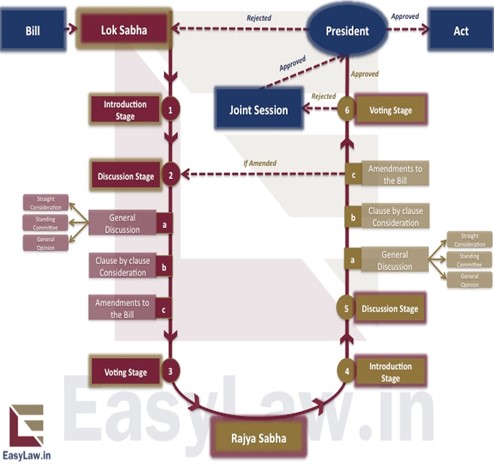September Activity – Dream Parliament
EXPECTED OBJECTIVES
- Students will be able to recognize the process of making laws in their country.
- Students will be able to comprehend about parliamentary processes, code of conduct, and the importance of laws.
EXPECTED OUTCOMES
- Students will be able to demonstrate their understanding about the role of Cabinet and government in making law.
- Students will be able to describe about parliamentary processes, code of conduct, and the importance of laws.
SKILLS AND VALUES
Decision making, Critical Thinking
Responsibility, Fairness
SESSIONS’ OVERVIEW
| S. No. | Session Details | Estimated Time Required |
| 1 | Pre-Activity
|
45 Minutes |
| 2 | Classroom activity
|
45 Minutes |
STEPS OF THE ACTIVITY
Period 1
Pre Activity
Time required – 45 Minutes
Steps for the teacher:
1. Start the session by introducing the topic in the class. Ask them about their understanding of the parliament, bill, Act, etc. 2. Display the video in the class- How A Bill Becomes A Law
3. Explain the difference between bill and law to the students.
4. Explain the activity to be conducted in the next class:
“In the next class we will conduct an activity called ‘Mock Parliament’ and we will pass/reject a bill created by students.”
5. Select any 6 students and make them the ‘Drafting Committee’ of the class. Ask them to draft a bill on ‘Energy conservation bill for school’.
Ask them to write the bill as below:
Problem statement – Why is energy conservation important for school?
Status- What are current practices in school? Why energy conservation should be a part of school policy?
Thumb rules– Draft 5-10 rules to be followed by all students in the next 7 days to conserve energy in school.
Punishment– Mention fines and punishment for not following the rules.
6. Select other 6 students and make a ‘Research Team’. Ask them to audit energy utilisation practices in school and collect facts. Share the facts with the Drafting Committee.
7. Divide other students in two groups and make them Lok Sabha and Rajya Sabha members. Teacher will act as chairperson of both the houses. Ask them to come prepared for voting as well as questions and answers on the bill.
Sample Draft Bill:
a. Topic– Waste Management system for school.
b. Rules to be included in the bill-
1. Waste segregation at the source. (classrooms, canteen, playground, etc.)
2. Dustbins to be put up on each floor – 2 in each classroom.
3. Orientation programme should be part of the curriculum.
4. Fines and punishment for using polythene bags.
c. Reason for introducing the bill-
India is generating tonnes of waste every year. It goes into landfills and water bodies which creates harmful effects on the environment. To keep our environment safe and clean, we all should contribute. Waste segregation and management can be the first step towards this duty.
d. Punishment and fines-
Each class will be fined with Rs. 500 per month if waste segregation practice is not found to be followed during the inspection.
Polythene bag use is banned in school and every individual will be fined with Rs. 50 if found using polythene bags within the school campus.
Period 2
Classroom activity – Mock parliament
Time required – 45 Minutes
Steps for the teacher:
1. During the next class, explain the process of making laws through a chart streamlining the law-making process. (Refer to the Annexure 1)
2. Notify the students that today we will discuss the ‘Energy conservation bill’ to be presented by the Drafting Committee. After their presentation, Lok Sabha members will get a chance to ask questions about the bill and then they will vote for or against the bill.
3. After their turn, Rajya Sabha members will get a chance to ask questions about the same bill and then they will also vote for or against the bill.
4. If majority from both the Houses votes in favour of the bill, the bill gets passed and the teacher will sign the bill as President.
5. In case the bill is not passed by a majority in either of the House, the Drafting Committee will amend the bill as per consensus and the voting will take place again until the bill gets passed.
6. Invite the Drafting Committee members in front to present the bill.
7. Divide the class into two groups and ask them to sit as Lok Sabha members and Rajya Sabha members.
8. Start the session and follow the steps to accept/reject the bill.
Debrief
Ask students the following questions to debrief the activity:
- What have you learnt from the activity?
- What aspects of an alert, informed, and active citizen are covered through this activity according to you?
Reflection Sheets, Activity Report & Feedback Form
Teachers kindly fill in the feedback form, remind office bearers to fill activity report and remind students also to fill up the reflection sheets.
REFLECTION SHEET (TO BE FILLED BY STUDENTS)
REFERENCE SECTION / ANNEXURE
ANNEXURE 1
The process of making laws (For Printing)


Source - http://easylawinterestingarticles.blogspot.com/2012/11/how-are-laws-made-in-india.html





